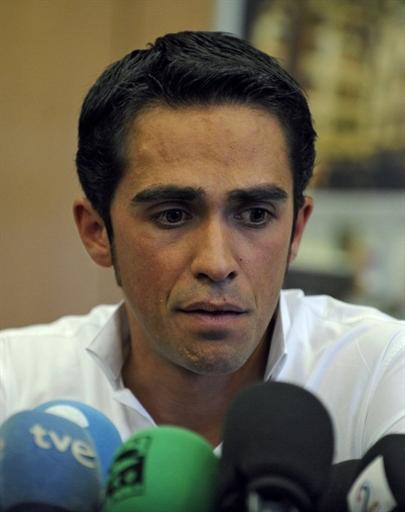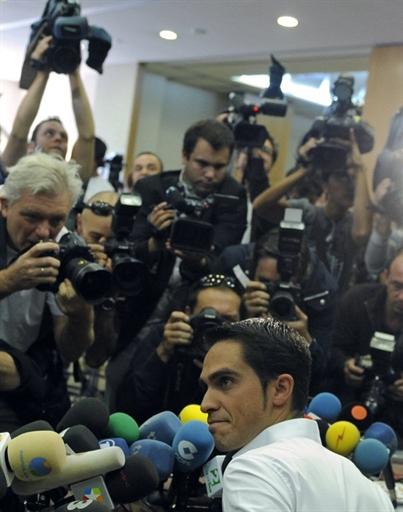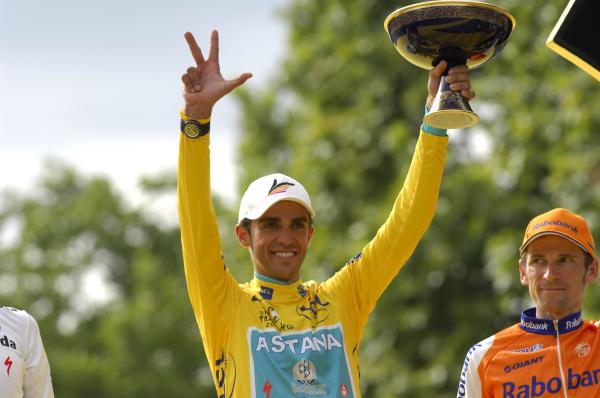David Walsh weighs in on Contador case
Author questions Clenbuterol claims, assesses cycling's state



David Walsh, author of From Lance to Landis and LA Confidentiel has given his reaction to the news that Alberto Contador has tested positive for Clenbuterol and may have used blood transfusions during this year Tour de France.
Alberto Contador tests positive for clenbuterol
Alberto Contador suspended over traces of clenbuterol from Tour de France test
Lemond shocked by Contador positive
Experts split on cause of Contador's Tour de France doping positive
Contador expects quick resolution of doping charges
Plasticisers in Contador’s urine could indicate blood transfusion
While Contador had vehemently denied altering his blood Walsh has also given a brutal assessment on the sport's governing body, the fans and the bare facts that clean riders face in the modern peloton.
Walsh, who is also the chief sports writer for the Sunday Times told Cyclingnews: "I'm not surprised by Contador. I'm always a bit surprised that they're caught but I'm never surprised that they might be doing it.
"I thought the whole idea of a guy coming from Spain and bringing meat to the Tour de France, it just didn't convince me. Who supplied the meat? Well Contador didn't know that even though he had a month to find out. He was told about this on the 24th of August, we're now talking six weeks later.
"Where did this beef come from? What's the name of the shop? That's important because we want to go back to the shop and ask who supplies the beef and does it have Clenbuterol in.
"You've now got Contador and Mosquera both in trouble and you have to think that this sport is going nowhere."
In a previous interview with Cyclingnews, Walsh raised doubts over the strength of the UCI's biological passport as a drug busting tool. The programme was introduced in order to monitor and detect unusual patterns in riders' blood, but Walsh believes that the cheats have stayed ahead of the curve, using the passport to monitor their doping.
Get The Leadout Newsletter
The latest race content, interviews, features, reviews and expert buying guides, direct to your inbox!
"I think the passport system has certainly had an effect. It's led to lower dosing and riders taking much better care of how much stuff they take at one time but it doesn't mean they're not doping. The ones that are doping have to be more vigilant using less doping products than it the past. It's a controlling operation rather than one that's completely stopped doping.
"I don't think that the UCI set out to make it like this but I imagine they're well aware of the reality because the scientists aren't idiots. They can look at the biological markers and my feelings are that in some cases the readings are just too normal.
"You expect them in certain bounds but not a straight line of normality and I know that that has been the case with some riders. Some of the profiles show too small a variation."
Walsh wasn't surprised with the UCI reaction to the news that Contador tested positive for Clenbuterol either, arguing that their stance suggested that the governing body were reluctant react.
"It's the usual UCI. They're totally uncomfortable with it and they want to believe that he didn't dope because it's damaging for the sport but that shouldn't be a factor. What they should be saying is if this guy has been cheating we really want to sanction him," Walsh said.
What happens to Contador now is open to debate. While the rider himself has threatened to retire if a conclusion is not swiftly reached, an element of confusion reigns over the likely outcome of his case. While he could be banned for the levels of Clenbuterol found in his body, the levels of plastics possibly found within his blood could lead to a precedent as no verified test has been legalised.
"It's almost there though," Walsh said. "And it's gone far enough so that the people conducting the disciplinary can assess the weight of evidence. So they could say we can't say it's a positive test but that there's a very high level of probability and this fits with our feeling of where the Clenbuterol may have come from."
Walsh has commented on the biggest doping cases within the sport in the last 20 years but according to the Irishman the latest revelation is not the most damaging. He says fans of the sport have already taken their positions on doping and no matter how many riders are caught, will always hold the same beliefs.
"The sport is already seriously damaged. Opinions are now so polarised that there are very few people who believe in this sport and who are capable of being turned off by the next big positive.
"All those that were going to turn away have long since done so because there's just been so many doping cases in those post-Armstrong years. There was obviously loads of suspicion about Armstrong, and then there were the likes of Rasmussen and Vino.
"People have been turning away for a long time and the people that support this sport have made a decision that they don't care how many positive tests there are they're going to continue to support this sport because they love it. Some of those people would say they hope it gets cleaner but if it's not cleaner that doesn't mean they'll turn away."
However in the short term, regardless of Contador's guilt or innocence, the sport has taken a damaging blow.
"Maybe Saxo Bank would look at it and walk away but someone else would take their place. Don't expect big business to take a moral stance on cycling. We all know what happened to Festina watches when it was found out that the team were systematically doping - sales jumped up.
"To me this sport will go on, there's no doubt on that. The Tour de France is a fantastic and epic sporting event but does the sport have a good reputation? Not at all. Does people still enjoy it? Yes, of course they do. What percentage of those still supporting it believe it to be clean? I don't know but I'd imagine a small percentage.
Walsh's sympathy lies with the sport's riders who compete and race clean.
"It's terribly sad because there are some great riders out there that don't want to dope and who are not doping. They are getting screwed. Your heart goes out to young riders who you believe in but you also think that they face a really difficult challenge in terms of ever finding out how good they are because as they climb that ladder they will meet more people who are doping and the battle becomes an unfair one.
"The one thing that really should bother right minding thinking people is that no one cares for honest men getting screwed. The journalists don't care, the race officials don't care, the sponsors don't care, and sadly you have to say that the public don't care. That's always been the issue for me."
Daniel Benson was the Editor in Chief at Cyclingnews.com between 2008 and 2022. Based in the UK, he joined the Cyclingnews team in 2008 as the site's first UK-based Managing Editor. In that time, he reported on over a dozen editions of the Tour de France, several World Championships, the Tour Down Under, Spring Classics, and the London 2012 Olympic Games. With the help of the excellent editorial team, he ran the coverage on Cyclingnews and has interviewed leading figures in the sport including UCI Presidents and Tour de France winners.
